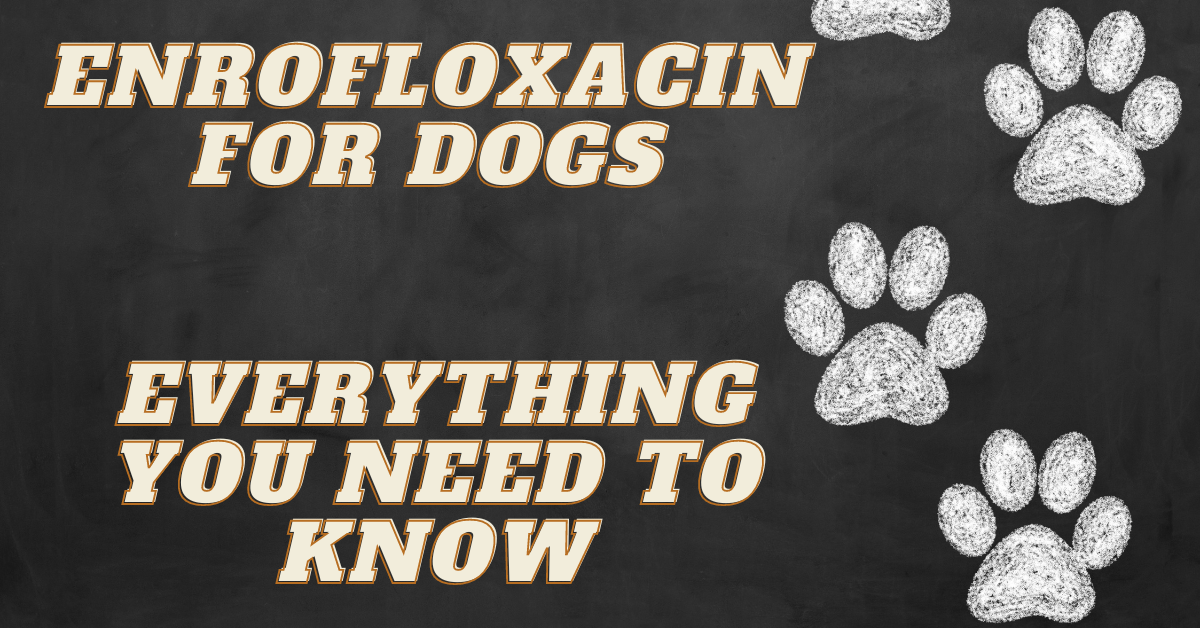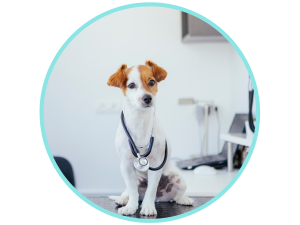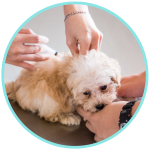





Has your pup developed an infection that won’t go away? Certain medications are available in the market to treat bacterial infections in dogs. However, some infections are so severe that they need specific drugs only. Enrofloxacin for dogs might be one of them. For your pooch to get back to normal health as quickly as possible, a vet visit might be in order.
Your dog’s veterinarian might prescribe Enrofloxacin to treat such types of stubborn infections. Enrofloxacin for dogs is effective against a variety of bacterial species. But it’s important to get it right the first time to prevent further complications.
If you’d rather listen to this blog, just click play on the YouTube video below:
Top 10 FAQs About Enrofloxacin for Dogs
As a vet, I routinely get asked questions about medications for dogs. Enrofloxacin for dogs is one of them. This medication has both pros and cons that need to be taken into consideration before prescribing.



If you’d like to know more about home medications that can help your pet, check out our vet-approved list below.
| Dyne for Dogs: For Energy & Weight Gain | Omeprazole for Dogs: For Ulcers & Inflammation | Enrofloxacin for Dogs: For Bacterial Infections |
Cefpodoxime for Dogs: For Bacterial Infections | Sucralfate for Dogs: Chronic Upset Stomach | Cosequin for Dogs: For Joint Health |
| Ursodiol for Dogs: For Liver & Gallbladder | Trazodone for Dogs: For Anxiety & Aggression | Mometamax for Dogs: For Ear Infections |
| Credelio for Dogs: For Ticks & Fleas | Chlorpheniramine for Dogs: For Allergy-Related Conditions | Butorphanol for Dogs: For Painful Coughs |
| Dinovite for Dogs: For Irritating, Itchy Coat | Dasuquin for Dogs: For Joint Health | Meloxidyl for Dogs: For Pain & Inflammation |
| Glandex for Dogs: For Digestive Support | Rilexine for Dogs: For Bacterial Infections | Enalapril for Dogs: For Cardiac Conditions |
| Quercetin for Dogs: For Allergy & Inflammation | Carprovet for Dogs: For Pain & Inflammation | Pimobendan for Dogs: For Congestive Heart Failure |
| Simplicef for Dogs: For Bacterial Infections | Clindamycin for Dogs: For Bacterial Infections |
Let’s take a quick look at the top ten frequently asked questions with regard to enrofloxacin for dogs.
#1 What is Enrofloxacin and how does it work for dogs?
Enrofloxacin is an antibiotic medication that belongs to the fluoroquinolone class of drugs. It works by inhibiting bacterial DNA synthesis, which helps to control bacterial infections in dogs.
#2 What are the common uses of Enrofloxacin in dogs?
Enrofloxacin is commonly used in dogs to treat bacterial infections, such as urinary tract infections, skin infections, and respiratory infections.
#3 How is Enrofloxacin administered to dogs?
Enrofloxacin is typically administered orally in the form of a tablet or liquid suspension. It should be given with food to ensure proper absorption.
#4 How long does it take for Enrofloxacin to start working in dogs?
Enrofloxacin can start working within hours of administration, but it may take several days to see full effects.
#5 What are the potential side effects of Enrofloxacin in dogs?
Common side effects of Enrofloxacin in dogs can include vomiting, diarrhea, and loss of appetite. More serious side effects can include joint stiffness and nerve damage.
#6 Can Enrofloxacin be given to pregnant or nursing dogs?
Enrofloxacin should not be given to pregnant or nursing dogs, as it can have harmful effects on fetal development and can pass into breast milk.
#7 Are there any drug interactions to be aware of when giving Enrofloxacin to dogs?
Enrofloxacin can interact with certain medications, including antacids and other antibiotics. It is important to inform your veterinarian of all medications your dog is currently taking before starting Enrofloxacin.
#8 What should I do if I miss a of Enrofloxacin for my dog?
If you miss a dose of Enrofloxacin for your dog, give the missed dose as soon as you remember. However, if it is close to the time for the next dose, skip the missed dose and continue with the regular dosing schedule.
9 How long can my dog take Enrofloxacin?
The duration of Enrofloxacin treatment for dogs can vary depending on the type and severity of the infection being treated. Your veterinarian will provide guidance on the appropriate duration of treatment for your dog.
#10 Can Enrofloxacin be used to treat viral infections in dogs?
No, Enrofloxacin is an antibiotic that is only effective against bacterial infections. It cannot be used to treat viral infections in dogs.



Let’s take a more detailed look at some of these questions.
Q: What is Enrofloxacin for Dogs?
A: Enrofloxacin is an antibiotic that belongs to the class fluoroquinolone. This class of antibiotics is considered the most effective against several bacterial types. Certain infections that are difficult to treat can be easily treated using enrofloxacin for dogs.
However, enrofloxacin is not an appropriate treatment option for infections due to fungi, viruses, and other parasites.



Q: What is Enrofloxacin Used for in Dogs?
A: Enrofloxacin for dogs belongs to a broad-spectrum antibiotic group that is effective against several bacterial infections. This antibiotic is helpful to combat infections resulting from:
- Psedomonas aeruginosa
- E. coli
- Klebsiella
- Enterobacter
- Campylobacter
- Salmonella
- Haemophilus
- Chlamydia
- Aeromonas
- Shigella
- Proteus
- Yersinia
- Vibro
- Brucella
- Staphylococci
Most of the time, veterinarians recommend enrofloxacin for dogs having skin and urinary tract infections. Moreover, enrofloxacin for dogs also shows promising results in certain conditions:
- Abscesses
- Wound
- Respiratory infections (kennel cough)
- Gastrointestinal tract infections
Furthermore, certain types of complicated infections can also be treated using enrofloxacin. These include:
- Ear infections
- Bone infections
- Sinus infections
- Pneumonia
Likewise, this antibiotic is in practice in combination with other medications in severe cases, thus known as empiric therapy.
Q: What are the Different Forms of Enrofloxacin for Dogs?



A: There are different forms of enrofloxacin for dogs available in the market. Therefore, you must ensure you get the right one for your dog. The label mentioned on the bottle will help you out.
One of the most common brands of enrofloxacin is Baytril. It comes in Tablet form, usually, light brown in color and round in shape.
Moreover, the tablet contains the letter B on one side and the corresponding dose on the other. Don’t forget to check for the appropriate potency.
However, there are other options in the form of injectables to administer enrofloxacin to your dog. These are available as follows:
- Intravenous IV (for administration into the vein)
- Intramuscular IM (for administration in muscles)
- Subcutaneous SC (for administration in the innermost layer)
In addition, enrofloxacin for dogs is also available in liquid form. Your vet will decide which form is suitable for your dog.
Q: Enrofloxacin for Dogs Precautions
A: The oral administration of enrofloxacin for dogs needs provision with a full meal. This is because of the chances of gastrointestinal disturbance occurring. This type of disturbance is more if your dog gets this medication on an empty stomach.
Q: Enrofloxacin for Dogs – Dosage
A: The dosage of enrofloxacin for dogs varies depending on the severity of the infection and the size of your pup. It is crucial to follow your veterinarian’s instructions in terms of dosage to ensure the proper treatment of your dog.



Moreover, you need to complete the course of enrofloxacin for your dog even if your dog starts feeling better. Never stop the medication on your own without taking instructions from the vet. It will do more harm by developing resistance against particular bacteria that may complicate the case in the near future.
In addition, hiding medication in your dog’s food is favorable if your pup isn’t fond of taking tablets.
Q: Enrofloxacin for Dogs – Are There Side Effects?
A: You must watch out for any side effects closely while giving enrofloxacin to your dog. Most of the dogs are unaffected throughout the enrofloxacin course of treatment. However, some dogs may develop mild to severe adverse effects.




Enrofloxacin does not induce sleep in your dog, but it may lead to the occurrence of certain side effects like:
- Diarrhea
- Vomiting
- Loss of appetite
- Weakness
- Depression
- Liver dysfunction
- Lethargy
- Seizures
- Nervousness
- Cartilage damage (in the growing age of dogs)
As always, if you notice any side effects with your dog’s medication, seek medical advice from your vet as soon as possible.
Q: What are the Risk Factors for Using Enrofloxacin?
A: Before using it for your furry friend, multiple risk factors must be considered. Pets who are allergic to enrofloxacin must not be administered with it.
Furthermore, if your furry friend belongs to a small or medium breed under 8 months, you should not use enrofloxacin. Puppies of large breed dogs who haven’t passed their growing phase should not be administered enrofloxacin.



Pets suffering from kidney disease, liver disorder, or seizures may suffer from danger. Likewise, enrofloxacin must not be used for pregnant dogs. They have known effects on cartilage.
If any vital organ, especially the liver, is already affected by the disease, using enrofloxacin may put your dog in danger. The veterinarian’s advice in this matter is worth it.
Q: Do I need to Monitor my Dog While They are Being Administered Enrofloxacin?
A: Yes, you need to monitor your dog for any adverse effects. There are some general signs that you can monitor in your dog.
For example, a dilated pupil increased respiration and agitation may indicate danger. You can also have your pet under the supervision of your veterinarian.
Q: How Do You Safely Store Enrofloxacin for Dogs?
A: If you want to store enrofloxacin for dogs, you should do it at room temperature below 30°C. The place where you store it should be dry and protected from direct sunlight and UV radiation.
The container you use to put in the drug should be airtight. Especially if you have a liquid form of enrofloxacin, don’t let it freeze.
Q: What Can You Do in Case of an Emergency?
A: If you face any emergency, you should first call your veterinarian. Your dog may show adverse effects; that is why you need immediately call your vet.



If a vet is unavailable, you need to contact the emergency facility and follow the instructions as described.
Enrofloxacin for Dogs Reviews
A quick search online will show that pup owners seem to be pretty happy with this antibiotic. Let’s take a look at some enrofloxacin for dogs reviews.












Enrofloxacin for Dogs – Final Thoughts from a Vet




You may have heard a lot about antibiotics and their good use. Enrofloxacin for dogs could be a good option for your dog if they suffer from certain types of bacterial infections. However, this medication can come with some serious side effects if not administered properly. When it comes to Enrofloxacin for dogs, you should always, always, always follow your vet’s recommended dosages.
Related posts:



Dr Saba Afzal is a clinical veterinarian and a professional content writer. I am determined to disseminate ideas worth spreading to pet owners everywhere around the world. As an experienced veterinarian, I am dedicated to delivering accurate and updated knowledge to pet owners
I have more than five years of experience in content writing on different online platforms, including Fiverr, Upwork, and Guru. My expertise is in Microbiology, Biotechnology, Pets Animal Management and handling, and training. You will find my content truly fascinating, unique, and compatible with the world’s standards. I always write original content without any plagiarism and taking care of any grammatical errors.
I will be happy to address your queries and comments. Contact me here

3 Comments